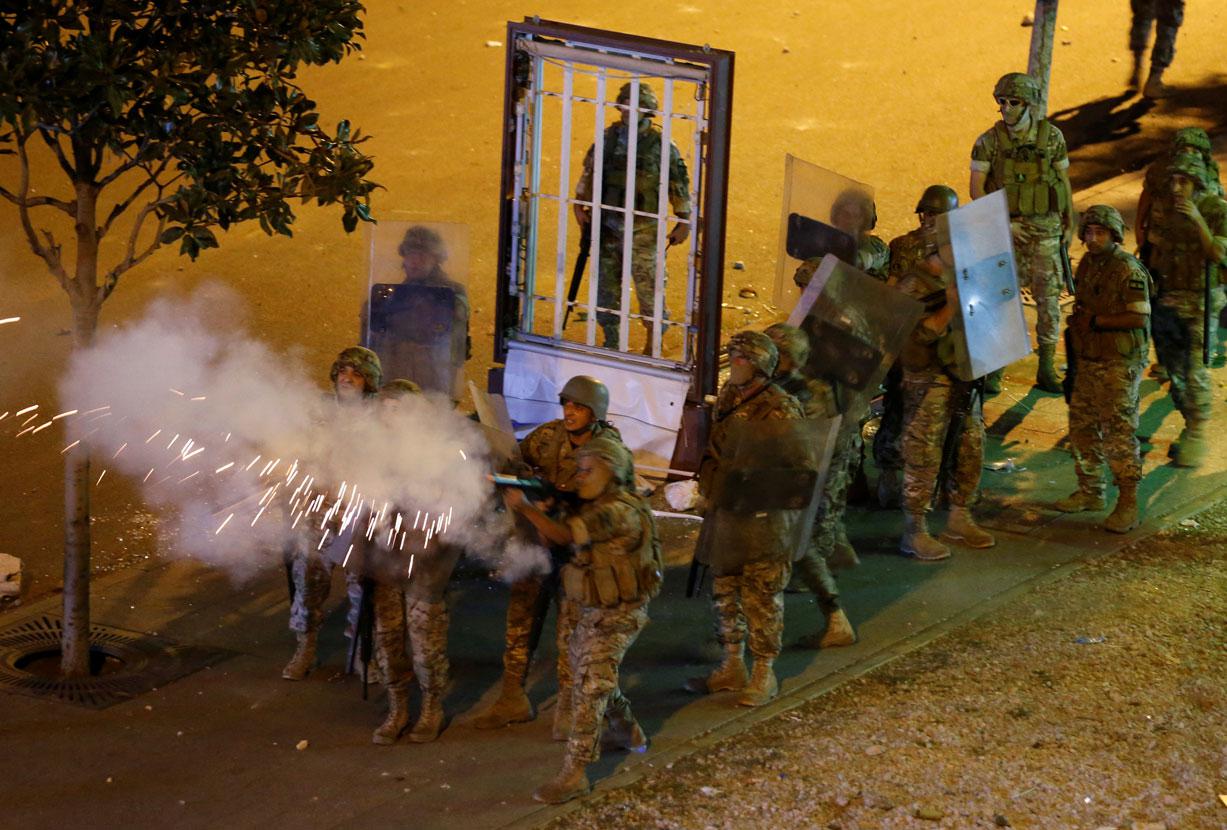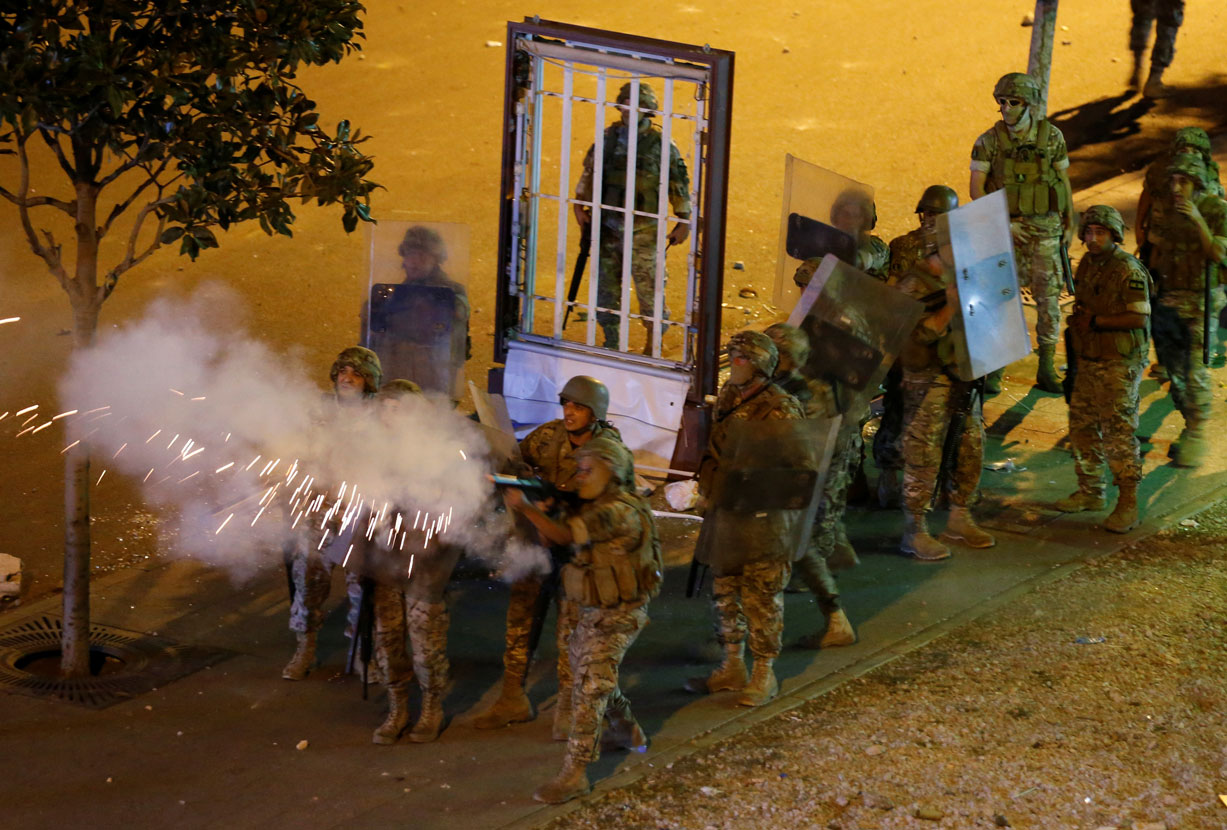Lebanese army moves to contain protests, government bickers
BEIRUT - The Lebanese army moved to end a wave of protests against tax increases and alleged official corruption Saturday as the fragile governing coalition fractured over promised economic reforms.
Troops reopened some major highways that had been blocked by protesters after firing tear gas and water cannons to disperse the huge crowd that had gathered into the early hours in Riyadh al-Solh Square in the heart of the capital Beirut.
The Internal Security Forces said 70 protesters were arrested.
Prime Minister Saad Hariri has given his deeply divided coalition partners until Monday evening to give their backing to a reform package aimed at shoring up the government's finances and securing the disbursement of desperately needed economic assistance from donors.
In a televised speech addressing the protests on Saturday, Hariri's political rival and Hezbollah leader Sayyed Hassan Nasrallah said the group opposed the government's resignation, and that the country did not have enough time for such a move given the acute financial crisis.
"Everyone should take responsibility rather than being preoccupied with settling political scores while leaving the fate of the country unknown," said Nasrallah, adding that Lebanon could face "financial collapse".
"All of us have to shoulder the responsibility of the current situation that we arrived at in Lebanon. Everyone should take part in finding a solution," added Nasrallah, whose Iranian-backed Shia group is Lebanon's most influential.
Groups of young people gathered on the streets of the capital during the morning, preparing for a new day of protests despite the burgeoning crackdown.
They collected tyres and other material with which to throw up improvised roadblocks.
Parts of central Beirut looked like a war zone on Saturday morning, littered with broken glass, overturned litter bins and the remains of burning tyres. Banks and many restaurants and shops remained closed.
'This state tramples'
Later on Saturday, thousands of demonstrators poured into Lebanon's streets for the third day of anti-government protests, directing growing rage at the political elite they blame for driving the country to the economic brink.
From the south to the east and north, protesters blocked roads, burned tyres and marched through the streets to keep the momentum going.
In central Beirut, the mood was fiery and festive with protesters of all ages waving flags and chanting for revolution outside upmarket retailers and banks that had their storefronts smashed in by some rogue rioters the night before.
"This country is moving towards total collapse. This regime has failed to lead Lebanon and it must be toppled and replaced," said Mohammad Awada, 32, who is unemployed. "We no longer feel we have a state. This state tramples on all institutions."
The demonstrations first erupted on Thursday, sparked by a proposed 20 cent tax on calls via messaging apps such as WhatsApp.
Such calls are the main method of communication for many Lebanese and, despite the government's swift abandonment of the tax, the demonstrations quickly swelled into the largest in years.
The protesters are demanding a sweeping overhaul of Lebanon's political system, citing grievances ranging from austerity measures to alleged corruption to poor infrastructure.
Thousands of people of all ages, sects and political affiliations brought the capital to a standstill on Friday, with demonstrations reported across the country for a second day.
The protests that swept villages and towns across Lebanon recalled the 2011 Arab revolts that toppled four presidents. Lebanese from all sects and walks of life waved banners and chanted for Hariri's government to go.
In southern Lebanon, Amal militiamen loyal to parliamentary speaker Nabih Berri attacked peaceful demonstrators who tore his posters and chanted slogans denouncing him as corrupt. They prevented TV crews from filming the protests.
Minor clashes continued through the night pitting groups of young men against the army.
One protester in the southern city of Nabatieh, a Hezbollah stronghold, vowed to defy the crackdown.
"They are trying to portray us as a mob, but we are demanding our rights," he told a local television channel. "We are used to repression."
Lebanon's internal security apparatus said 52 police were injured on Friday and its forces arrested 70 people.
Lebanon has one of the highest public debt burdens in the world and the government is trying to reach agreement on a package of belt-tightening measures to cap the deficit in next year's budget.
The promised austerity moves are essential if Lebanon is to unlock $11 billion in economic assistance pledged by international donors last year.
'Not seeing better days'
In his speech on Saturday, Nasrallah predicted that imposing more taxes would lead to an "explosion" of unrest.
"If we don't work towards a solution we're heading towards a collapse of the country, it will be bankrupt and our currency will not have any value," he said.
"The second danger is a popular explosion as a result of wrong handling of the situation," Nasrallah said.
In the southern port city of Tyre protesters filled the streets.
"I am taking part because over the last 30 years warlords have been ruling us. I am about to be 30 and my parents still tell me tomorrow will be better. I am not seeing better days ahead...," said Sylvia Yaqoub, 29, a laboratory manager.
"We want back the money they stole because 30 families are ruling five million people. We won't accept this any longer."
The government, which includes nearly all Lebanon's main parties, has pledged no new taxes as it seeks to finalise a 2020 budget.
The budget could help it unlock billions of dollars pledged by international donors who have conditioned their support on long-delayed reforms to curb waste and corruption.
"The protests must continue because this is a matter of our dignity. We'll be left humiliated otherwise," said Miriam Keserwan, 28.
Riot police in vehicles and on foot rounded up protesters late on Friday, firing rubber bullets and tear gas canisters to disperse riots in Beirut that grew violent as the night wore on, leaving streets strewn with glass and burning debris.


